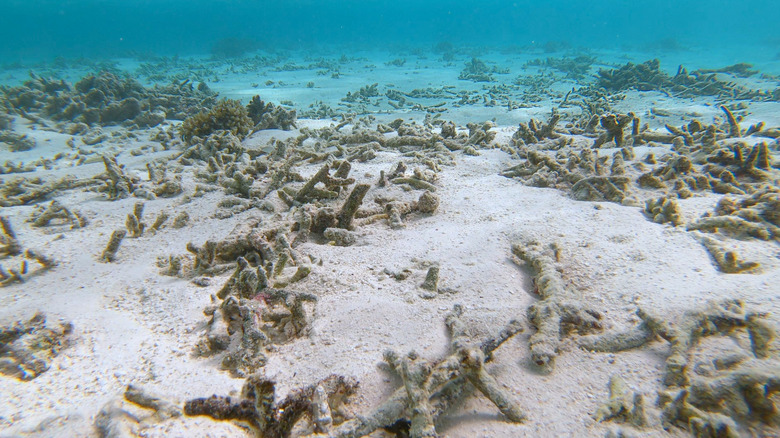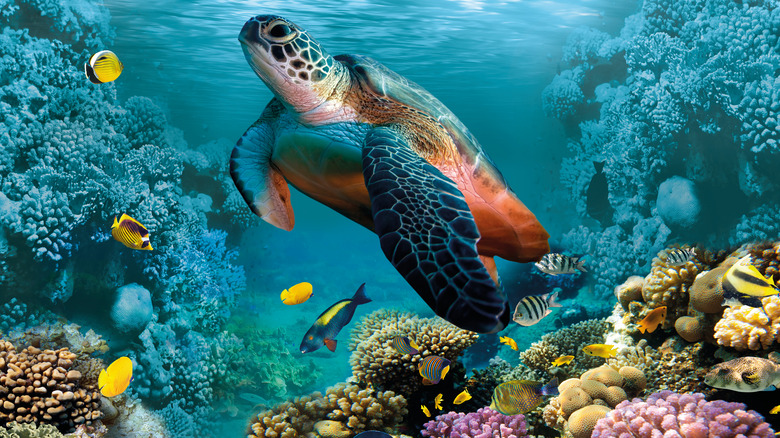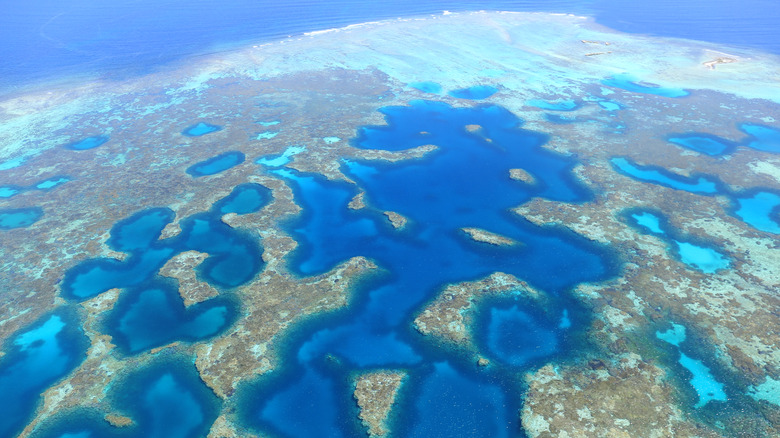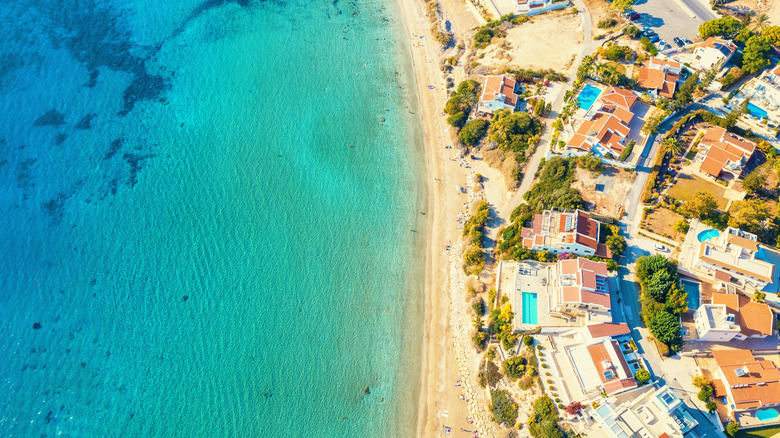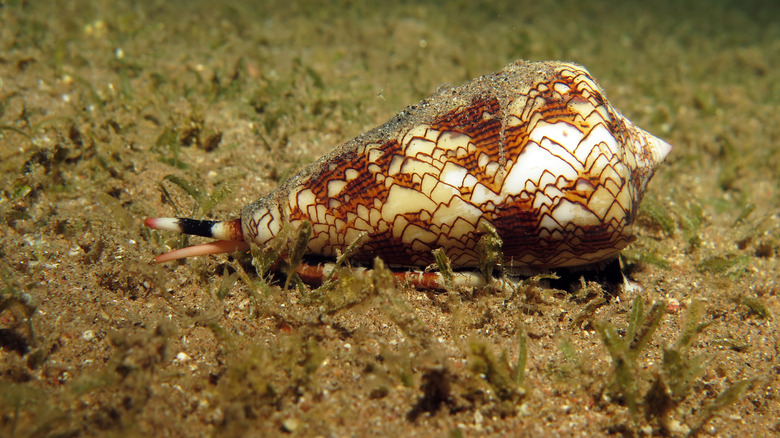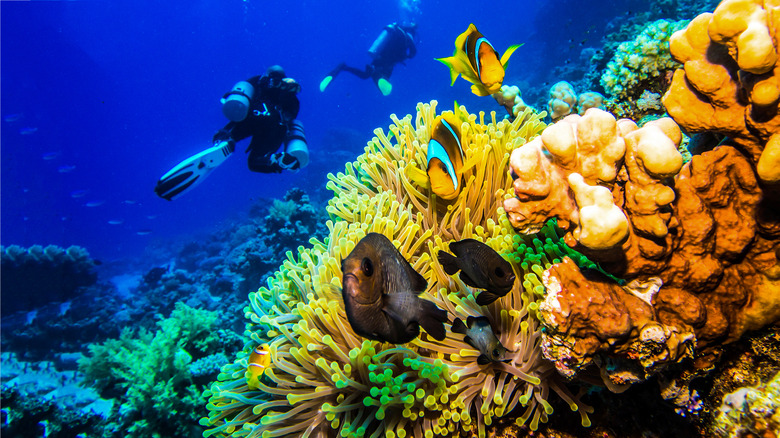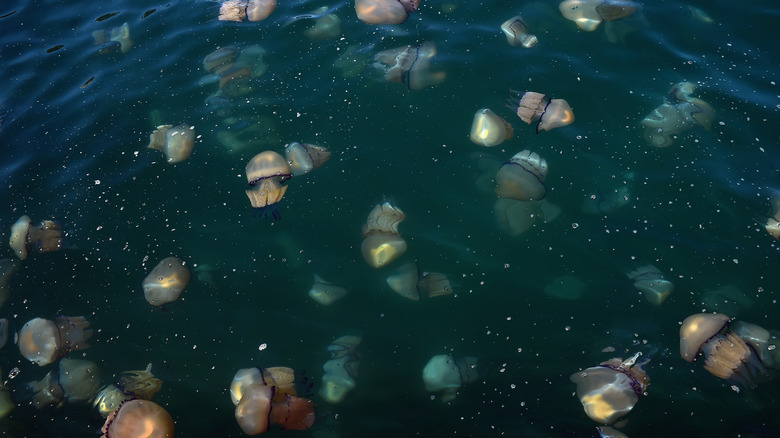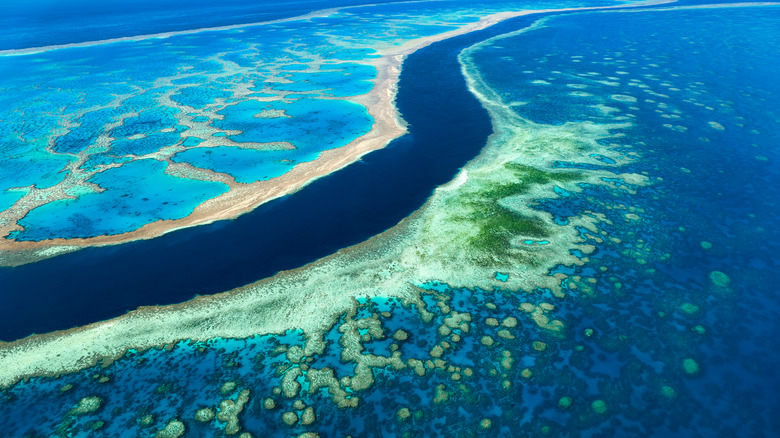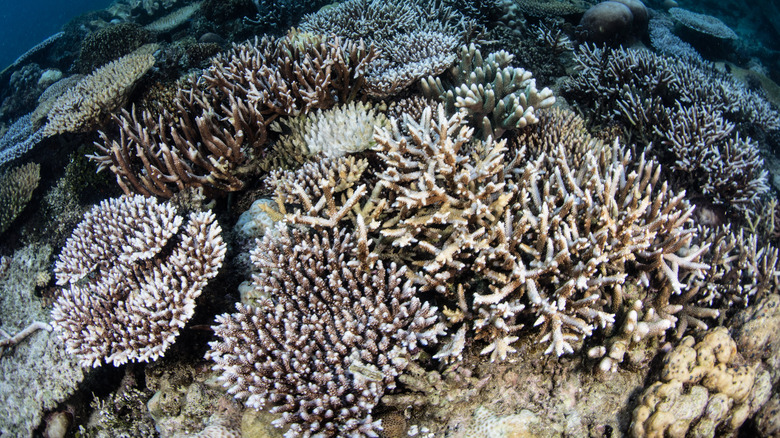What Would Happen If Every Coral Reef Died?
Time and time again, humanity has demonstrated its limitless capacity for death, defacement, and destruction. Sometimes, it effortlessly dishes out all three simultaneously. Consider a sight that divers sometimes stumble across: a coral sapped of its natural colors, sporting etched letters spelling out the name of some irresponsible tourist who should have known better.
There are two kinds of corals, named for their physical characteristics. There are hard or stony corals, which people tend to think are rocks, and soft corals, which even the most experienced diver may mistake for a plant. Both of these assessments are wrong though, because corals are actually animals (via FlipScience). These invertebrates are part of the same phylum as jellyfish, and they are unable to move on their own. Hard corals can end up forming coral reefs, massive structures that provide food and shelter for other organisms (and even soft corals).
Simply put, damaging a coral reef means harming living organisms. And because of the different (and in some cases, very slow) coral growth rates, a coral vandal could be undoing hundreds or even thousands of years of growth (via FlipScience). Add pollution, rising sea temperatures, and various other threats to corals' existence, and the potential for their global eradication becomes even greater. The extinction of corals would be unbelievably horrific for every other living thing on the planet for several reasons. Here's what would happen if every coral reef died.
Roughly a quarter of Earth's marine life would have no place to live
Around the globe, coral reefs don't take up much of the underwater world. In fact, according to LiveScience, the total space occupied by coral reefs worldwide makes up less than 1% of the ocean floor. Despite this, coral reefs are a great source of food and shelter for a wide assortment of flora and fauna — so much that their sudden disappearance would leave about 25% of the Earth's marine species homeless.
Think of coral reefs as the marine equivalent of cities, with an incredible number of plant and animal species living in them. These residents include over 4,000 different types of fish and about 700 coral species, among others (via the Coral Reef Alliance). And those are just the species that call coral reefs home; if one were to consider every plant and animal benefiting from coral reefs in some way, the total could easily reach over a million.
Sea turtles, clownfish, sea slugs, groupers, parrotfish, algae, and seagrasses are just a few of the species that would lose their habitat — and possibly go extinct — if all of the world's coral reefs were to die (via INSH). And just like insects, if even just the smallest members of the global food web get wiped out for good, it's not unthinkable for the bigger species that consume them to follow suit.
Coastal fishing industries across the world would suffer
Reef Resilience Network reports that innumerable species of fish, mollusks, crustaceans, and other marine food sources live and thrive in coral reefs, making these underwater structures incredibly important to the global fishing industry. In fact, according to Business Insider, 1.5 million jobs in the United States are in the fishing industry — and about 50% of all commercial and recreational fisheries under federal management would not be able to sustain marine species (and meet their production quotas) without coral reefs.
The same goes for elsewhere in the world. Take Southeast Asia, for example. Conservation Gateway says that reef fisheries in the region bring in a whopping profit of $2.4 billion per year, while enabling half a billion people from various countries including Indonesia, Malaysia, and the Philippines to make a living (via INSH). Meanwhile, the World Resources Institute pegs the annual Caribbean coral reef income at about $395 million.
All in all, losing the world's coral reefs would mean losing approximately $375 billion all over the globe, including income from fisheries, according to Time.
The world would be short on seafood — and would likely go hungry
Of course, if coral reefs die out, the species that depend on them for protection and sustenance would join them, sooner or later. And because said species tend to be part of the human diet, a global food shortage would become a serious consequence of coral reef extinction. The world would see leaner catches on both the commercial and community level, and the loss of coral reefs as a whole would deprive the world of billions of dollars' worth of food and other services necessary for existence (via the California Academy of Sciences).
According to the Coral Reef Alliance, approximately one billion people depend on reef fish and other reef-dwelling marine organisms for their protein needs. Business Insider estimates that a person consumes about 50 pounds of seafood annually. The publication also pegged seafood's share of the world's protein supply at an astonishing 20%. Incidentally, most of that comes from marine species living in coral reefs (via the United Nations Food and Agriculture Organization). Hunger and food insecurity are already major challenges in several parts of the world, and decimating an entire category of food would make things much, much worse.
There would be greatly increased pressure on land-based farming
The principle that nature abhors a vacuum doesn't just apply in the worlds of physics and philosophy. The abrupt elimination of something that fills a certain need or niche will not go unnoticed, and will almost always lead to dire consequences. Thus, if marine food production were no longer capable of feeding the mouths of billions of people across the planet, land-based farms would have no choice but to pick up the slack, according to INSH. And if that happened, it could easily become a global catastrophe.
For starters, the inevitable expansion of agricultural space would become a problem. With population growth comes an ever-increasing demand for food, and if land-based produce is the only option, sustaining the global population would require more land, period. This, in turn, would likely negatively affect the land's overall health in terms of soil degradation and pollution (via National Geographic). Farms already expel huge amounts of agrochemical residue and even veterinary medication (such as growth boosters and antibiotics for farm animals), which can be greatly damaging to the environment.
In addition, intensified farming efforts would necessitate even more water extraction. As the Food and Agriculture Organization explains, agriculture is already responsible for about 70% of the world's water withdrawals, which will likely increase by at least 15% come 2050. Imagine how much water it would take to feed the world with aquafarming out of the picture.
Coastal tourism all over the globe would sustain a massive hit
Unsurprisingly, the fishing industry wouldn't be the only one to experience a heavy blow if coral reefs died out. International tourism would also suffer tremendously. According to Business Insider, over a hundred countries and territories all over the globe draw tourists in because of coral reefs. As the Coral Reef Alliance explains, tourism and fisheries combined solve provide employment and generate billions in revenue.
Research has shown that industries related to coral reefs account for more than 50% of the gross national product in their respective countries. Based on projections cited by the World Economic Forum, the global growth rate of coastal and marine tourism sits at around 3.5%. At this rate, this sector of the world's ocean economy will account for more than a quarter of its total value come 2030.
However, if coral reefs were to completely vanish from the face of the Earth, coastal and marine tourism would understandably drop significantly (to be more specific, about $36 billion, based on numbers from Business Insider). Thus, for people whose livelihoods depend on coastal tourism, the decimation of global reef populations could easily translate to unemployment and hunger.
Coastlines — and the people living near them — would take a deadly beating
Coral reefs don't just provide colorful shelter for marine species; they also help terrestrial organisms survive natural hazards. Due to the way that hard corals are positioned, they act as energy-absorbing barriers, protecting coastlines from massive and powerful waves (via Coral Guardian). Coral reefs also serve as natural shields against strong winds and extreme weather disturbances, safeguarding citizens from the worst of cyclones while greatly reducing the chances of flooding and erosion (via INSH).
According to Business Insider, coral reefs are such effective defensive structures that by the time a tsunami reaches the coastline, its overall strength could be reduced by up to a staggering 97%. At least 200 million people living along coastlines depend on coral reefs for protection, according to a 2018 WWF report. Without coral reefs, it would take about $2.5 million per mile to achieve the same results.
As LiveScience explains, if coral reefs vanished, towns, communities, and even whole countries could go underwater. And those lucky enough to escape and survive such a calamity might find themselves stateless. How Stuff Works adds that in addition to a lack of food and resources, political turmoil will also follow, as entire territories disappear from the face of the Earth.
The world would miss out on many life-saving discoveries
Due to the immensely biodiverse ecosystems that coral reefs support, these underwater formations serve as fertile ground for medical discoveries. According to the Coral Reef Alliance, coral reefs have provided scientists with numerous compounds that have been incorporated into medicines, including certain cancer treatments. In fact, marine species are reportedly at the center of over half of all cancer treatment studies today. One example (via Business Insider) is a type of nudibranch or sea slug, a small and colorful invertebrate related to snails. Other reef-dwellers, like cone snails, possess key compounds that could help in the development of many life-saving drugs in the future (via FlipScience).
From treating heart diseases and ulcers to eliminating deadly pathogens, marine experts and pharmaceutical scientists have taken advantage of the medicinal riches of coral reefs to solve many human ailments. Bone grafting has also greatly improved thanks to coral reefs: In 2013, ScienceDaily reported that corals' exoskeletons are being studied and refined for use in human bone grafting procedures. Unsurprisingly, this has earned coral reefs the nickname "medicine chests of the sea" (via Coral Reef Alliance).
Many experts believe that there's still much to discover from coral reefs in terms of medicine. In fact, there could be up to 400 times more medical innovations and treatments waiting to be revealed from corals — that is, if they don't go extinct (via Business Insider).
The diving industry would likely sink
It's hard not to appreciate the sheer beauty of a coral reef ecosystem teeming with life. On their own, vibrant corals themselves are more than enough of an attraction to draw in intrepid divers and nature-lovers. Factor in the countless species that find food and shelter there — the massive schools of fish, colorful soft corals, aquatic plants, sea turtles, crabs, starfish, eels, and so much more — and it's no wonder that approximately one million scuba divers apply for certification each year, according to the Professional Association of Diving Instructors (via the Reef-World Foundation). Imagine all the coral reefs suddenly disappearing; the sheer loss of biodiversity would understandably lead to a significant decrease in diving's popularity.
It's worth noting, though, that improper and unsupervised diving practices are also greatly contributing to the demise of coral reefs all over the world. The U.N. Environment Programme states that nearly 90% of divers end up doing damage to coral reefs with each dive. And with every diver who accidentally kicks corals, etches their name on them, or snaps them off as souvenirs, the quality of life in the reef's ecosystem decreases significantly.
The sea would be a whole lot slimier (and full of jellyfish)
The extinction of coral reefs would be a truly terrible event, one that won't take place. Of course, that hasn't stopped scientists from trying to figure out exactly how bad things would become if that came to pass, mainly to strengthen calls to prevent it. One of the more interesting (and weirder) projections is an abundance of seaweed — and, subsequently, sea jellies (via INSH).
According to the Reef-World Foundation, after the coral reefs die and their hard exoskeletons break apart, algae and various microbes would spread all over the ocean bed, sustained by sunlight. This phenomenon would likely result in these organisms producing a ton of slime, significantly affecting the quality of the water. This could also inadvertently cause jellyfish populations to boom. While this may not seem like such a bad thing at first, it would actually throw the entire global food web way off balance.
Swarms of jellyfish would dominate, gobbling up microorganisms left and right while leaving little food for other marine life to consume (via the Guardian). Oh, and people will definitely be affected by this as well; jellyfish population booms have already demonstrated their devastating effects on aquaculture and other human activities, including blocking the filters of a nuclear power plant and jeopardising sea-bed mining (via the World Economic Forum).
There would be a lot less oxygen to sustain life on Earth
Humans and other animals owe their ability to live and breathe on coral reefs. According to EcoWatch, experts estimate that only about 0.0025% of the oceanic floor has coral reefs, but these structures are responsible for producing about 50% of the oxygen on Earth. On top of that, coral reefs take in almost a third of the carbon dioxide that humans produce. In other words, the death of coral reefs would significantly reduce breathable air for humanity, while leaving us to deal with the unimpeded repercussions of carbon dioxide overabundance.
In an interview with Business Insider, marine scientist Michael Crosby put it bluntly and succinctly: "You like to breathe? Estimates are that up to 80% of the oxygen you are breathing in right now comes from the ocean. It doesn't come from the land. In order for you to continue to breathe, you have to have a healthy ocean." And without coral reefs, the world's oceans will be anything but healthy.
The world's largest living structure would just disappear
It's a common misconception that the Great Wall of China is visible from outer space. It actually isn't, not even in low Earth orbit. Or at least, not without a ton of technological assistance, as NASA demonstrated. What can be seen from space, though, is the network of 3,000 reefs and 900 coral islands forming the Great Barrier Reef (via NASA's Jet Propulsion Laboratory).
A protected marine area and World Heritage site, the Great Barrier Reef isn't just the world's largest coral reef, but also the planet's largest structure composed of living organisms (via FlipScience). Approximately 400 different coral species live there, in addition to various types of sea turtles, marine mammals, crustaceans, algae, and other ocean-dwellers (via LiveScience). According to UNESCO, the reef has about 4,000 different fish species and 1,500 types of molluscs.
Unfortunately, this ancient ecosystem has come close to dying in recent years. Corals get their rich colors from the algae that live in symbiosis with them (via the National Ocean Service). When the ocean temperature rises, corals become stressed and expel the algae from their tissues. In doing so, they lose their main food source and their color (hence the name for this phenomenon: coral bleaching). Unless they recover, bleached corals are more likely to die, especially if the temperature doesn't go down. For perspective, it only took two years for half of the Great Barrier Reef to turn ghostly white due to climate change (via INSH).
There may be more serious impacts that we haven't even imagined
Perhaps the most terrifying aspect of losing coral reefs is the fact that it could lead to greater devastation than what experts can predict. According to the Coral Reef Alliance, there is no other living organism on the planet that can adequately fill the void that coral reefs would leave behind.
Time and again, coral reefs have demonstrated extraordinary resilience (via the Washington Post). Their ability to bounce back from bleaching events is well-documented and even admirable; however, it is not infinite. Without effective measures in place to mitigate the effects of human activities on coral reef health, these irreplaceable marine resources could be wiped out by 2050.
Marine scientists admit that it's simply impossible to predict everything that will happen when the world loses all of its coral reefs (via How Stuff Works). In other words, worldwide hunger, the fall of global industries, the extinction of countless marine species, and the stagnation of medical discovery could just be the beginning of a larger ecological nightmare — one that humanity should try extremely hard to prevent.
